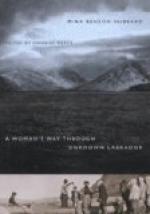The hill was wooded almost to the top, and above the woods was the barren moss-covered summit. The walking was very rough. It seemed to me as we climbed that I should be stifled with the heat, and the flies, and the effort, but most of all with the thoughts that were crowding my mind. Instead of being only glad that we were nearing Michikamau I had been growing more and more to dread the moment when I should first look out over its broad waters. Sometimes I felt that I could never go on to the top—but I did.
The panorama of mountain, and lake, and island was very impressive. For miles in every direction were the lakes. Countless wooded islands, large and small, dotted their surfaces, and westward, beyond the confusion of islands and water around us, lay the great shining Michikamau. Still we could see no open way to reach it. Lying along its eastern shore a low ridge stretched away northward, and east of this again the lakes. We thought this might perhaps be the Indian inland route to George River, which Mr. Low speaks of in his report on the survey of Michikamau. Far away in the north were the hills with their snow patches, which we had seen from Lookout Mountain. Turning to the east we could trace the course of the Nascaupee to where we had entered it on Sunday. We could see Lookout Mountain, and away beyond it the irregular tops of the hills we had come through from a little west of Seal Lake. In the south, great rugged hills stood out west towards Michikamau. North and south of the hill we were on were big waters. The one to the south we hoped would lead us out to Michikamau. It emptied into the lake we had just crossed in a broad shallow rapid at the foot of our hill, one and a half miles to the west.
George showed me, only a few miles from where we were standing, Mount Hubbard, from which Mr. Hubbard and he had seen Michikamau; Windbound Lake and the lakes through which they had hoped to find their way to the great lake; the dip in the hills to the east through which they had passed on their long portage. He pointed out to me a little dark line on the brow of the hill where the bushes were in which they had shot the rabbit, and on the eastern slope another dark shadow showing where they had shot the ptarmigan.
So much of life and its pain can crowd into a few minutes. The whole desperate picture stood out with dread vividness. Yet I had wished very much to see what he had shown me.
At the rapid we were but a few minutes poling up to the big water south. Then after two miles of paddling, still southward, we rounded a point and looked westward straight into Michikamau and the sun. It was 5.52 P.M.
When the exclamations of delight had subsided Gilbert asked: “Do we have rice pudding for supper to-night, Mrs. Hubbard?”
That evening we camped in an island flower-garden.




